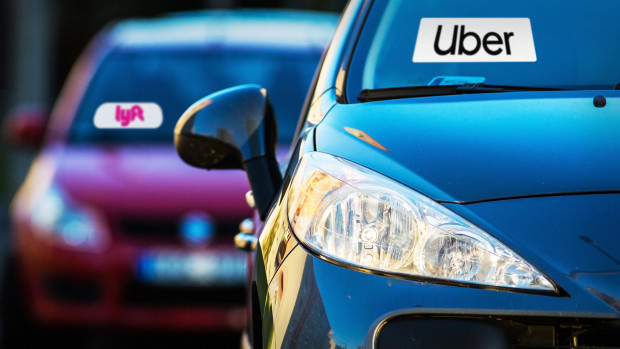
Dara Khosrowshahi has some big news: the price wars are over.
Well, maybe not over, but the Uber Technologies (UBER) -) CEO believes that the ride-sharing company is entering a new phase in its competition with Lyft (LYFT) -) and others.
DON'T MISS: Why Jim Cramer Sold One of His Favorite Pharma Stocks
"I think that the era of of fighting purely based on prices over," he told CNBC on Aug.1. "That was 3-4 years ago and it was just about volume, but investors now want profitable volume and if the only thing you have to offer is a lower price you're not offering much, ultimately."
Khosrowshahi made his comments as his company posted a surprise second quarter profit, its first as a public company, and forecast solid near-term gains amid the broader travel boom and normalizing return-to-office working patterns.
“There's a lot to like here,” wrote Real Money’s Stephen Guilfoyle. “Surprising, but also convincing profitability due to cuts in operating expenses as much as to revenue growth. Free cash flow explosion. Healthy enough balance sheet. Strong performance in two of three sectors.”
Uber's top executive doesn't seem to be losing too much sleep over Lyft.
'We've Got Scale'
"I don't spend too much time worrying about Lyft, so to speak," he said. "Lyft was not price competitive with us a year ago. They are price competitive with us now, and now we can focus on competing based on brand, based on service, based on innovation and with products like UberX, share and reserve."
As far as Lyft and other competitors, Khosrowshahi said, "we think in that world, we have an advantage; we've got scale."
Back in May, Lyft’s new CEO, former Amazon (AMZN) -) executive David Risher, told CNBC’s Jim Cramer that the company doesn’t need to annihilate the competition to turn around its fortunes.
“I don’t need to dethrone a king,” Risher said. “Five years from now, I hope people are no longer asking about Uber and Lyft.”
And Emil Michael, former Uber Chief Business Officer said on CNBC’s “Closing Bell: Overtime”, said on July 31 that price war is not in Lyft's best interests.
"If you try to match Uber on price," he said, "their network is so big that if they match you, you could drain your cash balance pretty quickly, and Lfyt's cash balance is a lot smaller than Uber's, so I don't think anyone wants a price war, especially Lyft, but if there is a price war, Uber will probably win."
During the interview with Khosrowshahi, CNBC's Andrew Ross Sorkin noted that Uber was once the outlier that came into cities with low, competitive prices, and "put a lot of folks either out of business or shifted the business."
"You became the successful one and now the price has gone up," he said.
Prices Rise with Inflation
"The prices have gone up along with inflation everywhere," Khosrowshahi said, "and when you look at the prices going up, a significant portion of that price is being passed on to actually, drivers."
Uber's freight sector has been hurting, however, with revenue down 30% year-over-year due to lower revenue per load and volume, “both a consequence of the challenging freight market cycle,” the company said.
Khosrowshahi said consumers are spending more money on services, which "benefits our mobility, delivery businesses."
"Freight grows when people ship stuff," he said, "when they buy stuff. This year people are buying more services. Our freight business is down, we're adjusting costs, but our mobility and delivery businesses are growing."
Uber Freight laid off 40 to 50 people last month in its legacy digital brokerage operations in the second round of cuts this year, FreightWaves reported. The company cut 150 jobs in January.
“I don't know what you do with Freight,” Real Money's Guilfoyle wrote. “There's less freight to move these days, at least globally. So far that's been a low margin business for this firm even when it works."
"I am sure management is thinking about that, but this is a tenacious bunch, as is their leader... CEO Dara Khosrowshahi," Guilfoyle said. "That dude is perseverant.”







